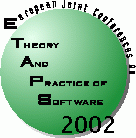
Workshop on Theory and Practice of Timed Systems
(A satelite event of ETAPS 2002)
April 6-7, 2002, Grenoble, France
Organizers: Eugene Asarin, Oded Maler and Sergio Yovine
The study of time-dependent behavior is treated currently
under different titles by different communities. Classical problems of
manufacturing scheduling, for example, are considered as part of operation
research and industrial engineering. Similar but different scheduling problems
are encountered in the research on real-time operating systems. People
who are interested in semantics, verification or performance analysis are
working on models such as timed automata, timed Petri nets or max-plus
algebra. Electrical engineers have to consider propagation delays in their
circuits and designer of embedded controllers have to take into account
the time it takes for the controller to compute its reaction after sampling
the environment. The unifying theme underlying all these apparently different
domains is that they treat systems whose behavior depends upon combinations
of logical and temporal constraints, i.e. constraints on the distance between
the occurrences of two events.
The workshop goal is to promote the study of fundamental
and practical aspects of timed systems. The three major axes of interest
are listed below:
Foundations and semantics: contributions to a better theoretical
foundations for timed systems and timed formal languages as well as a comparison
between different models used by different communities (timed automata,
timed petri nets, max-plus algebra, etc.).
Algorithms and tools: new algorithms and data-structures
for analyzing timed systems and resolving temporal constraints. are needed
in order to push timing technology into the real world.
Applications: adaptation and specialization of timing technology
to the modeling and analysis of certain types of application domains in
which timing plays an important role (real-time software, hardware circuits
and problems of scheduling in manufacturing or telecommunication).
Invited Speakers: (Abstracts )
Giorgio Buttazzo, University of Pavia
Towards Adaptive Real-Time Systems
Avi Efrati, Intel Haifa
Real Life Timing Analysis at Intel
John Hooker, Carnegie-Mellon Univesity
Scheduling by a Combination of Mathematical and Constraint Programming
Claude Le Pape, ILOG SA
Temporal and Resource Constraints in Constraint-Based Scheduling
Joseph Sifakis, Verimag Grenoble
Restricting the Behavior of Timed Systems
Program committee:
Rajeev Alur, U. Penn, Philadelphia
Eugene Asarin, Verimag, Grenoble (co-chair)
Ahmed Bouajjani, LIAFA, Paris
Jordi Cortadella, U. Catalunya, Barcelona
Sebastian Engell, U. of Dortmund
Tom Henzinger, U. California, Berkeley
Bengt Jonsson, U. of Uppsala
Kim Larsen, U. of Aalborg
Insup Lee, U. Penn, Philadelphia
Oded Maler, Verimag, Grenoble (co-chair)
Chris Myers, U. Utah, Salt Lake City
Peter Niebert, U. Provence, Marseille
Antoine Petit, ENS, Cachan
Paul Petterson, U. of Uppsala
Amir Pnueli, Weizmann Institute, Rehovot
Alex Rabinovich, U. of Tel-Aviv
Jean-Francois Raskin, Free University, Brussels
Karem Sakallah, U. Michigan, Ann Arbor
Ken Stevens, Intel, Hillsboro
Wang Yi, U. of Uppsala
Sergio Yovine, Verimag, Grenoble (co-chair)
List of Accepted
Papers with abstracts
Workshop Program
Useful links:
The
workshop page
ETAPS 2002
VERIMAG
ENTCS
